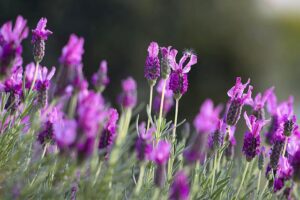Lavender: In the Middle Ages, lavender was considered the herb of love.
The name, Lavender, was derived from the Latin verb “to wash” and both the Romans and Greeks scented their soaps and bathwater with the herb.
 The Plant:
The Plant:
Lavender is a mint-family flowering plant with a sweet floral aroma that is easily recognized. It’s said to be native to the Mediterranean, the Middle East, and India, and it has a 2,500-year history. Lavender was once thought to be a sacred herb.
Today, some think of it as the English garden herb, others think of the Lavender Alps in the south of France where the hills are alive with color and scent. Lavender is a bushy, branching shrub, the stems of which often become a dense, woody tangle. The flowers are small, lavender-purple and bloom in June and July. It is native to the Mediteranean region, naturalized in the southern United States and is widely cultivated throughout the world.
Uses:
Scientific study revealed that lavender oil may have spasmolytic, antiseptic and carminative powers. Rub a drop of the oil on your temples to help relieve a headache.
The German Standard License for lavender tea lists it for restlessness, sleeplessness, lack of appetite, nervous irritable stomach, meteorism, and nervous disorders of the intestines. Lavender preparations are traditionally used to treat symptoms of neurotonic disorders, especially minor sleeplessness.
- It can also be used to treat skin conditions including Rosacea, Eczema, and Psoriasis.
- It may be helpful as a treatment of functional circulatory disorders.
- It is also used in perfumed products. The leaves repel insects.
Uses, Preparations & Dosage:
Safe but should be used in moderation. One teaspoon of flowers to a pint of water for infusions can be used as a mild sedative.
For eczema and psoriasis, add no more than two drops of oil to a cup of olive oil.
Add a few drops of this mixture in a hot bath to relieve neuralgia pain or sore feet.
Warm lavender tea can be applied as a compress for the relief of chest congestion.
Unless otherwise prescribed, Tea extract, and bath additive. Internal: Infusion: 1–2 teaspoons in 150 ml water. Essential oil: 1–4 drops (approximately 20–80 mg). Note: Combinations with other sedative or carminative herbs may be beneficial.
For treating skin conditions including rosacea, wash and pat dry the area to be treated. Try a very small amount to test for allergic reaction first. If all is well, soak a cotton ball and gently massage it into affected areas. Repeat daily. Note: This oil has antiseptic and anti-inflammatory properties, but must be used with caution as a potential allergen.
Want to easily grow this and other medicinal herbs? Grow here!

 The Plant:
The Plant: